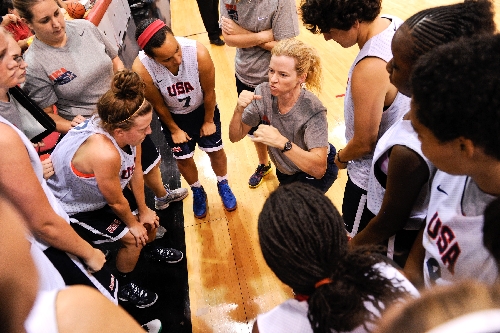Deaflympics could be long shot for U.S.

Had you walked into Cox Pavilion during the first quarter Tuesday, you would have noticed basketball being played at a pretty high level. You also might have noticed that after somebody made a 3-pointer or a nice pass on a fast break, the arena was eerily quiet.
It was sort of like going to a Sacramento Kings game.
But because I had arrived early and witnessed the starting lineups being announced in sign language instead of over a public-address system – and because basketball was being played at a pretty high level – I knew this wasn’t a Kings game.
It was a team of deaf and hard-of-hearing women’s basketball players representing USA Deaf Basketball International matched against a team that included WNBA veteran Sequoia Holmes and other ex-UNLV Lady Rebels who are not hearing-impaired.
The players who could hear won 76-53, but that had nothing to do with it. They were just the better team.
In the second game, a deaf and hearing-impaired USA men’s team, playing together for the first time, beat Riverside (Calif.) Community College 56-54 by storming back from a 12-point deficit in the fourth quarter.
The crowd roared – by standing and holding arms up high, and smiling, and twirling hands around in small circles. This is sign language for storming back from a 12-point, fourth-quarter deficit.
During the women’s game, I met David Hamilton, the most decorated deaf basketball player ever, a 6-foot-4-inch forward who played at Southern Illinois-Edwardsville and Pierce Junior College in California and then at Gallaudet University, the world leader in education and career development for deaf and hard-of-hearing students in Washington, D.C.
The U.S. men have won all 14 gold medals in the Deaflympics, and Hamilton played on five of those teams. When I asked why he wasn’t playing Tuesday, he signed that he owes me a beer. Because whereas Hamilton, the USA Deaf Basketball International director, looks half his age, he is 48.
Upon learning that he was from Lexington, Ky., I pantomimed a long 3-point shot and made a circle with the thumb and index finger of my left hand, and thrust the index finger of my right hand through it, using a dramatic downward motion. This is an Indiana basketball fan’s sign language for Christian Watford’s buzzer-beating basket that beat Kentucky 73-72 on Dec. 10.
Hamilton then showed me sign language for cutting down the nets in New Orleans.
I also learned that 6-11 Lance Allred, who played at Utah and Weber State, is hearing-impaired. As is 5-9 Luke Adams, who averaged nearly 20 minutes per game after walking on at Texas Tech last season.
Both hope to play in the Deaflympics next year, if Hamilton can find sponsors. Because whereas somebody is picking up the tab for LeBron and Kobe and the NBA bazillionaires to hoop it up against Tunisia in London – and it’s a pretty huge tab – nobody is paying for the deaf basketball teams to travel to Bulgaria.
Hamilton signed a question: Do I know this Steve Wynn guy?
The deaf basketball teams receive a $25,000 equipment allowance from Nike, but that’s about it.
About that time, the buzzer went off at the end of the first quarter of the women’s game. Both teams appeared to hear it. Hamilton said deaf players develop the other senses to where they can sense a buzzer sounding or a whistle blowing, without hearing it.
In the USA huddle, Stephanie Stevens, one of the coaches, was getting her point across without uttering a word. She had this expression on her face, a cross between pain and anger – sort of like Frank Martin, when the refs blew a call against Kansas State.
Stevens’ hands flew around rapidly. It was like Jerry Lee Lewis playing the piano, or a guy trying to flag down the beer man at Yankee Stadium.
When the second quarter began, the USA players started to get back on defense and find the open man.
Sometimes, as Bob Knight’s former players will attest, being able to hear isn’t all it is cracked up to be.
Mike Butterfield, a volunteer serving as Hamilton’s translator – Butterfield’s parents were born deaf – told a story about his friend Jeff Liu, the USA trainer, having had double-cochlear ear implant surgery “because he wanted to hear birds sing.”
Soon after, they were watching TV when – how do I put this? – Butterfield had indigestion, and made a sound that one sometimes makes when one has indigestion. Or sits on a whoopee cushion.
Liu got up and went to the door. He thought somebody was knocking.
Las Vegas Review-Journal sports columnist Ron Kantowski can be reached at rkantowski@reviewjournal.com or 702-383-0352. Follow him on Twitter: @ronkantowski.